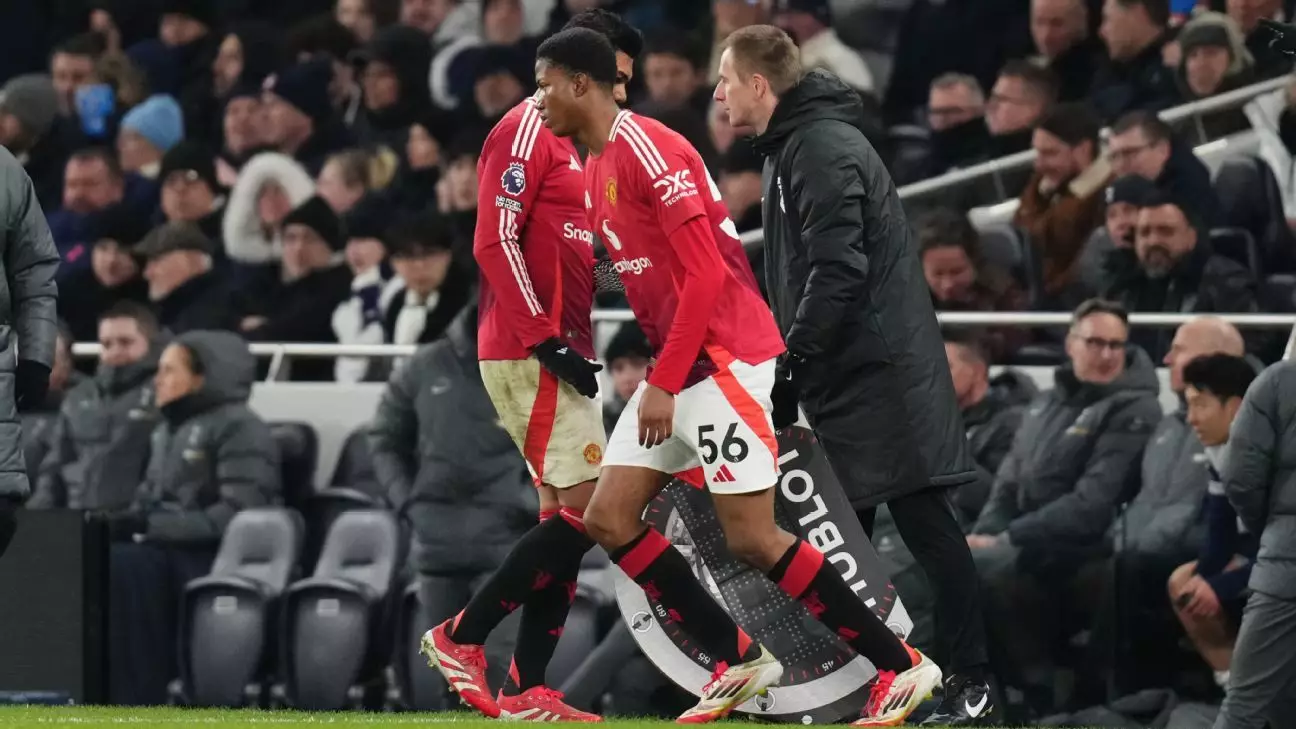Once heralded as the bastion of youth development and a breeding ground for footballing icons, Manchester United now faces a perplexing paradox in its tactical approach and player deployment. This decline is exemplified in their recent 1-0 loss to Tottenham Hotspur, where manager Ruben Amorim’s late-game decision-making raised more questions than answers regarding the utilization of burgeoning talent amidst a glaring injury crisis.
The stage was set for 17-year-old Chido Obi-Martin to make his debut when he was subbed onto the field in the dying moments of the match. Hailed for his prolific youth record after transferring from Arsenal, his senior debut lacked the fairy tale ending fans have come to associate with United’s youthful recruits. In a moment that ought to have been memorable, Obi-Martin never even touched the ball, encapsulating the desperation of United’s current situation. Rather than scripting a new chapter in the club’s storied history of youth success—think of the likes of Federico Macheda and Marcus Rashford—Obi-Martin’s introduction felt more like a last-ditch effort than a calculated injection of talent.
Injuries and a Fractured Squad
The extent of the injury crisis at United is alarming. With 12 players sidelined due to injuries or illness—including notable absentees like Kobbie Mainoo and Amad Diallo, the latter ruled out for the season—Amorim’s tactical flexibility has all but vanished. It is perplexing to see a club of United’s heritage reduced to fielding a bench filled predominantly with teenagers—most of whom were born after the Glazers took charge in 2005 and who have yet to taste the competitive atmosphere of a Premier League match. The integration of young talent under pressure is often a double-edged sword; it can be a boon for development or a damaging experience that could stall their progression.
In the context of the match against Tottenham, Amorim’s choice to insert Obi-Martin during stoppage time was a less-than-ideal gamble. A more favorable approach would have been to grant the young player proper time on the field to adapt and influence the game. By introducing him in such critical and time-constrained circumstances, rather than fostering growth, Amorim potentially hindered the player’s confidence and future contributions. This brings into focus a vital question: if a player is genuinely “ready,” then why not afford them adequate opportunity to shine?
While United’s performance in the latter stages of the match showcased some fight—the half-time adjustments and individual efforts from players like Alejandro Garnacho and Joshua Zirkzee failed to convert offensive pressure into goals—the fragility of the Tottenham team presented a missed opportunity for United. Instead of capitalizing on a vulnerable opponent, United failed to find any decisive blows, merely jabbing at a resolute defense without creating true scoring chances.
As this season progresses, United finds itself mired in historical lows, including a record 12 losses out of 25 Premier League games—its worst since the 1973-74 season, a campaign that ended with relegation. Although a repeat of that fate seems unlikely, the risk of sleepwalking into the summer without significant changes looms large. Amorim’s hope to curtail focus on the larger picture becomes increasingly difficult amidst a standing of 15th place without tangible improvements on the horizon.
The larger critique shines not only on the young talent under pressure but also on managerial decisions that may contribute to an unwanted legacy of ineffectiveness. United risks becoming an example of what happens when a once-great institution becomes overly dependent on inexperienced players rather than cultivating a balanced blend of youth and experience.
While Manchester United grapples with these internal challenges, Tottenham’s victory serves as a catalyst for hope under manager Ange Postecoglou. His commitment to play attractive, attacking football, alongside the return of injured players, may provide the tonic necessary for revitalization in their league campaign. The context surrounding the match culminated in the emergence of renewed ambition despite the discontent swirling around Spurs’ ownership.
Manchester United stands at a crossroads, needing urgent introspection. The reliance on youth talent, while vital for long-term strategy, must be tempered with wisdom in deployment, creating an environment conducive to growing expertise while still pursuing the success that will restore the club’s legendary status.

